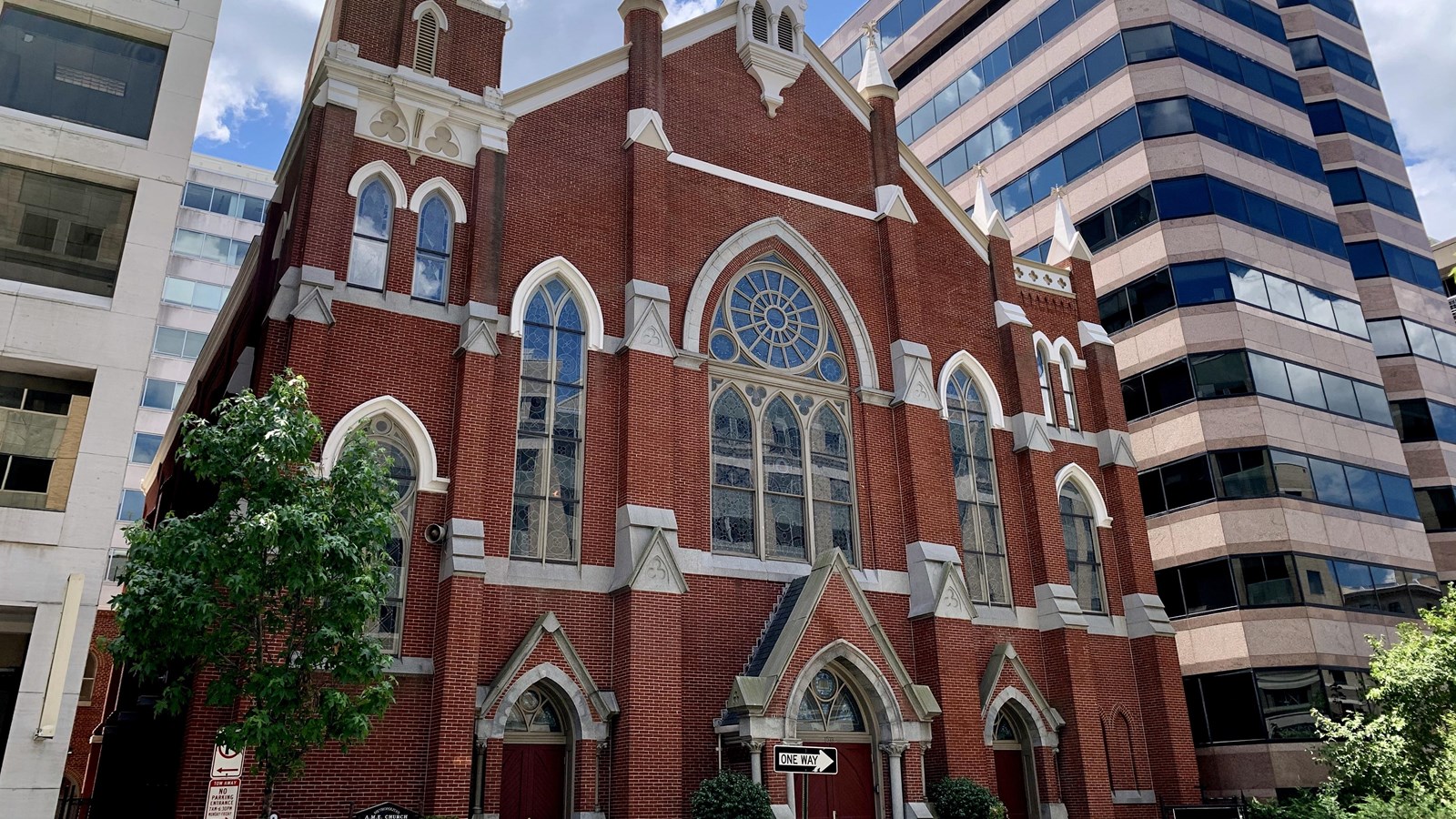Last updated: July 22, 2020
Place
Washington, DC: Metropolitan African Methodist Episcopal Church

Photo by AgnosticPreachersKid, CC BY-SA 4.0
The Metropolitan African Methodist Episcopal (A.M.E.) Church is one of the oldest churches organized by African Americans in Washington, D.C.
It was founded in 1872 after the merger of Israel Bethel and Union Bethel A.M.E. Churches. The segregation of white and Black parishioners at the Ebenezer Methodist Episcopal Church prompted the founding of Israel Bethel in 1821. To protest requirements that forced Blacks to sit in the galleries, free and enslaved Black parishioners left the church. The congregation of Union Bethel separated from the Fourth Street Church for identical reasons in 1838. At the time, members of the Ebenezer and Fourth Street Churches were mostly white.
When the Baltimore Conference accepted the merger of Israel Bethel and Union Bethel in 1872, the new church was given a new location on M street and a new name: Metropolitan A.M.E. Church. National A.M.E. leaders selected the location because of its proximity to the U.S. Capitol Building and the White House. In 1886, the construction of a new church building was completed in the same location. This structure was documented in the Historic American Buildings Survey and listed in the National Register of Historic Places on July 26, 1973.
Metropolitan A.M.E.’s parishioners included many African American leaders in Washington, D.C., like Frederick Douglass, Alethia Turner, and Bishop Daniel Turner. The church also served as the meeting place for the Bethel Literary and Historical Association. This organization was committed to educating African Americans. Educated, middle-class African Americans made up most of the Association’s membership. Meetings involved lively discussions and debates about racism, economic justice, and labor rights. The Association also hosted notable speakers and lecturers. They included Mary Church Terrell, Ida B. Wells, Booker T. Washington, and Mary Ann Shadd Cary.
Anti-slavery activist and journalist Mary Ann Shadd Cary became a regular and vocal presence within the Association. In History of the Bethel Literary and Historical Association, John W. Cromwell recognized Mary Ann's eloquent and compelling speaking ability. He described her “clear high treble voice and epigrammatic sentences” as a “signal for death-like stillness and oracular sayings that nearly always met popular approval.”
In 1881, Mary Ann contributed to a discussion about “eminent women of the Negro race.” She stressed: “The very low estimate in which the colored woman is held is attributable to colored men.” She also praised the “scores of colored women who in every walk of life had ennobled the race and whose examples threw a bright halo around us.” This conversation reflected Mary Ann’s involvement in the women’s rights and suffrage movements. She was a member of the National Woman Suffrage Association and spoke at the 1878 national convention. Mary Ann founded the Colored Women's Progressive Franchise Association in 1880 to advocate for African American women's voting rights.
Bibliography:
Cromwell, John W. History of the Bethel Literary and Historical Association, and Programme for the Year 1895-6. Pamphlet. Washington, D.C.: R. L. Pendleton, 1896. Library of Congress, Manuscript/Mixed Material, Mary Church Terrell Papers 1884-1962. Accessed March 3, 2020. https://www.loc.gov/item/mss425490257/.
Dennis, Carol Ann. “Metropolitan African Methodist Episcopal Church, Washington, D.C. (1821- ). Black Past. Published September 12, 2014. https://www.blackpast.org/african-american-history/metropolitan-ame-church-washington-d-c-1821/.
McHenry, Elizabeth. Forgotten Readers: Recovering the Lost History of African American Literary Societies. Durham: Duke University Press, 2002.
People’s Advocate. “The Literary.” December 31, 1881. Readex: African American Newspapers.
Rhodes, Jane. Mary Ann Shadd Cary: The Black Press and Protest in the Nineteenth Century. Bloomington, IN: Indiana University Press, 1998.
Washington, DC SP Metropolitan African Methodist Episcopal Church; National Register of Historic Places and National Historic Landmarks Program Records: Washington, D.C; National Register of Historic Places and National Historic Landmarks Program Records, 2013-2017; Records of the National Park Service, 1785-2006, Record Group 79; Washington, D.C. Accessed March 1, 2020. https://catalog.archives.gov/id/117692329.
